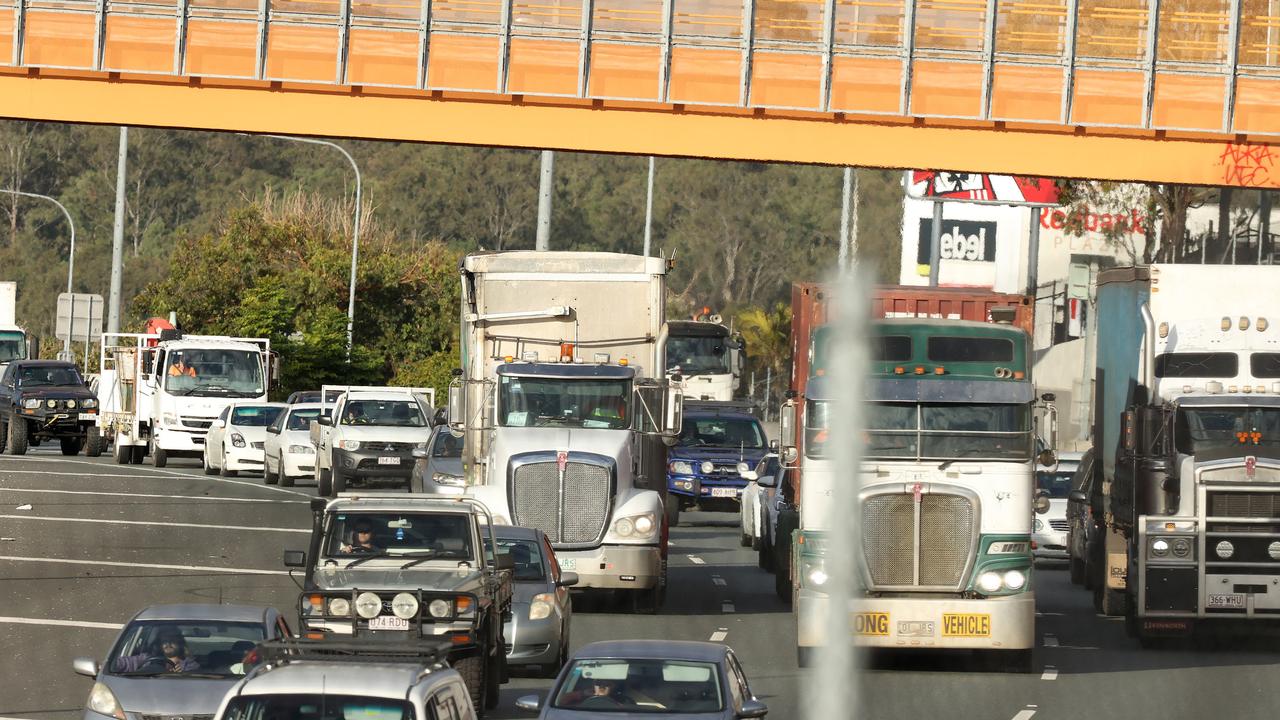Ipswich commuters are being warned their traffic system is on track to ‘fail’ as critical infrastructure investment from government lags, its mayor has claimed.
The warning comes from Ipswich City Council which says it consistently receives “far less than its fair share” in state and federal infrastructure funding as tens of thousands more vehicles are expected on Ipswich roads.
‘We Can’t Wait’ is a community-led campaign outlining the opportunities and risks Ipswich faces with its population expected to balloon to 533,000 by 2046.
The campaign calls on commitments to a public transport solution between Ipswich and Springfield, upgrades to the developing choke points and dangerous spots on the Cunningham and Warrego Highways and Planning work to begin on a second inner city river crossing.
“Aging and congested” David Trumpy Bridge, Ipswich Central
Mayor Teresa Harding says figures from the Queensland Government’s Transport and Roads Investment Program (QTRIP) ‘spelled out the shortfall’ her city faces.
“It is time that changed … without significant, urgent infrastructure investment, travel times in our city will explode, and excessive congestion will cost the Queensland economy more than $1 billion,” she said.
Mayor Teresa Harding says a breakdown of QTRIP funding per resident across all south-east councils shows Ipswich residents would receive the second lowest amount of funding in SEQ. Photo: Supplied
“Our growth is phenomenal, we’ve had more than 6000 people move to Ipswich every year, the last few years and our population will double in the next 20 years.”
The QTRIP details the funding local governments across the state will get over the next four financial years, between now and 2027-28.
Ms Harding says in that period, the QTRIP allocation for Ipswich is just $198 million despite the city being the epicentre of Queensland’s population explosion.
“In comparison, over that time Logan next door will receive more than $1 billion, and Brisbane more than $3 billion,” she said.
“Put another way, if we look at a breakdown of QTRIP funding per resident across all southeast councils, Ipswich residents would receive the second lowest amount of funding in SEQ.”
President of the Ipswich Region Chamber of Commerce Phillip Bell says government infrastructure investment in the region does not reflect or support Ipswich’s economic contribution.
President of the Ipswich Region Chamber of Commerce Phillip Bell says government infrastructure investment in the region did not reflect or supports Ipswich’s economic contribution. Photo: Supplied
“We’ve seen a massive influx of private investors, companies, multinationals, national companies investing in this region, recognising the significant growth that it has to offer economically,” he said.
“We’re equidistant between three international airports, and we sit on some key supply routes … smart money investment in infrastructure from the state government would send a very strong message to private industry that this is a great place to continue to do business.”
Caitlyn Cooper lives in Deebing Heights with her husband and two children, all of whom have epilepsy and one of her children has Cerebral Palsy.
Her husband recently had a seizure resulting in his licence revocation and what was a 12 minute drive to take the kids to school became a two and a half-hour public transport commute.
Caitlyn Cooper from Deebing Heights. Picture: Richard Walker
“It’s five kilometres to our local bus stop up a big hill, it’s not accessible, our child has cerebral palsy, he wouldn’t be able to walk up the hill,” she said.
“It results in me having to take excessive leave from work to commute my children, so we had to change schools and my son did not take that well.”
Ms Cooper is a nurse at the Queensland Children’s Hospital and says in the past five years her own commute has more than doubled to well over an hour and she is concerned it will get worse.
“With the Centenary being the one lane highway that it is, we’ve got so many houses being built between Redbank and Ripley, it’s just going to add to the traffic and it’s going to take even longer for me to get to work,” she said.
“These investments would change everything, it would make things more accessible for my husband so he might be able to still work after losing his license and take the kids to their NDIS therapies at Springfield.”
“Just even him being able to hop on the train and get out the house, he’s otherwise stuck in four walls because nothing’s really accessible around Deebing Heights.”
Ms Harding says the current infrastructure leaves the Ipswich community divided and she encourages residents to sign up to the waitlist at wecantwait.com.au.
“So we need that connectivity economically, but also just socially, for our communities, for us to be cohesive,” she said.
“Council is more than happy to sit down with anyone to advocate, what we’re asking for is very reasonable. The evidence is quite clear, we can’t wait for fairer infrastructure funding.”

